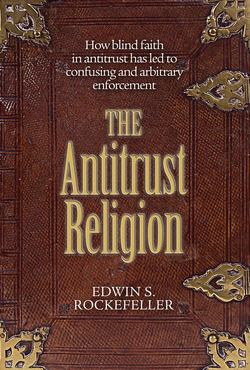Читать книгу The Antitrust Religion - Edwin S. Rockefeller - Страница 5
На сайте Литреса книга снята с продажи.
Introduction
ОглавлениеWe aspire to a government of laws, not of men. The rule of law implies ascertainable, coherent rules for guiding and judging behavior. It is the thesis of this book that antitrust law is not consistent with our aspiration for a rule of law. There is no such thing as antitrust law. Antitrust is a religion. Antitrust enforcement is arbitrary, political regulation of commercial activity, not enforcement of a coherent set of rules adopted by Congress.
Thurman Arnold, assistant attorney general for antitrust in the New Deal, described the origin of and need for the religion of antitrust in the following manner:
Historians now point out that Theodore Roosevelt never accomplished anything with his trust busting. Of course he didn’t. The crusade was not a practical one. It was part of a moral conflict and no preacher ever succeeded in abolishing any form of sin. Had there been no conflict—had society been able to operate in an era of growing specialization without these organizations—it would have been easy enough to kill them by practical means. A few well-directed provisions putting a discriminatory tax on large organizations would have done the trick, provided some other form of organization were growing at the same time to fill the practical need. Since the organizations were demanded, attempts to stop their growth necessarily became purely ceremonial.… The actual result of the antitrust laws was to promote the growth of great industrial organizations by deflecting the attack on them into purely moral and ceremonial channels.1
This book’s thesis will be developed first by defining antitrust as a religious faith with an existence independent of the antitrust statutes. Chapter 2 describes the development of a cult of professional followers who serve as a priesthood to carry out the ceremonial function of antitrust. Chapter 3 contains a brief history of attempts at reform. Chapter 4 discusses the central element of antitrust faith— “market power” —an imaginary, hypothetical concept borrowed from economic theory and used by the antitrust community as though it describes something that actually exists when, in fact, the concept of market power is based on false assumptions about a future that cannot be known. Chapters 5 through 8 describe activities attacking supposed evils identified by the antitrust religion and point out the inconsistency of those activities with our aspirations for a society ruled by laws and not men. The final chapter draws the tentative conclusion that educating society about the unsoundness of the basic elements of the antitrust faith might lead to meaningful change.
